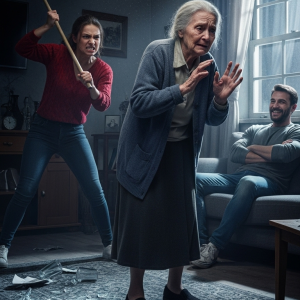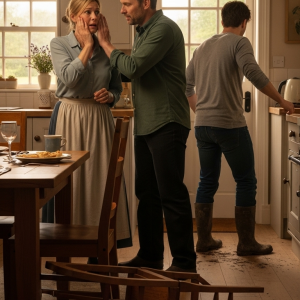They interrupted me twenty-one times while I was reading my husband’s will. The will he wrote with trembling hands before he died. I stayed quiet. I swallowed every sting, every insult, every smirk they thought I couldn’t see. But I hit record before the lawyer walked in. And what happened after that changed everything they thought they knew about me.
It was the kind of morning that crept in soft and slow, with light filtering through the kitchen window like it had for nearly forty years. The maple trees were turning, and Rey would have called it perfect coffee weather. I stood by the counter, both hands wrapped around my mug, not for the heat, but for something to hold. The quiet in the house wasn’t peaceful. It was the kind that hums when something is missing.
That morning, I took out the file he left me. Inside was the final version of his will, written in his own hand. He had asked me to read it aloud when the children returned. “It matters that they see your face while you say the words,” he’d whispered. That part, I think, is what broke me the most, because today they were all coming home.
Brandon was flying in from Phoenix. Mallerie and her husband would drive up from Connecticut. I’d already heard from both of them this week, not with questions about how I was holding up, but with questions about the will, the land, the accounts. When your son refers to your home as a “legacy property” in an email, something has shifted. When your daughter suggests repurposing the barn before she’s even seen the will, something has snapped.
I walked into Rey’s old office and placed the folder on his desk. I stared at the chair, the leather so worn it had taken the shape of his shoulders. The air felt thick, like it knew what was coming. They weren’t coming to honor him. They were coming to claim what they believed they were owed.
Mallerie arrived first, her heels clicking on the gravel like she was walking into a conference room. Her coat was sharp, her smile polite. She didn’t notice the ivy Rey and I had planted, now climbing higher than the windows. She came straight inside and called my name like I was a hotel concierge.
Brandon came three hours late. No apology, just a grunt as he kicked off his boots. He smelled of airport whiskey. The first thing he asked was if I had Wi-Fi. Not how I was doing, not if the house felt different without Rey. Just the Wi-Fi.
They settled at the kitchen table as if for a business meeting. Mallerie opened her tablet; Brandon dropped a folder beside his mug. They started showing me mock-ups and budget lines for what they called the “Dunning Revival Project”—a plan to turn the barn into an event space and the upper acres into luxury tiny homes. They never once said our family name. To them, it was just a brand.
Brandon explained their plan as if it were already in motion, talking of zoning options and investors. Mallerie chimed in with projections, using words like “potential” and “equity.” Her tone was sugary, but her eyes watched me, waiting for me to agree. They weren’t asking for permission. They were managing me. “It will free you from the burden of this old house,” Brandon said, as if I hadn’t already been living in peace until they decided to turn grief into a business plan.
When I asked about Rey’s will, they glanced at each other. Mallerie said they assumed he wanted what was best for the family. Brandon laughed. “Dad never liked wasting opportunities,” he said, pushing a draft agreement across the table. A transfer of partial ownership—sixty percent to them—with a dotted line waiting for my name. I finally saw it. This wasn’t about family. It was about leverage. And they believed they had it all.
The next morning, the living room was staged for a boardroom meeting. Brandon had arranged three chairs in a semicircle. Mallerie lit a cinnamon candle to make the space feel “warm.” It only reminded me of how much they wanted to control the atmosphere.
I brought down the envelope containing Rey’s will. He’d wanted it read aloud, no attorneys, no arguments, just us. I stood while they sat. The pages trembled in my hands, not from uncertainty, but from the weight of what was coming. I opened my mouth to begin.
“Have you reviewed the zoning document from yesterday?” Brandon cut in. That was the first interruption. I told him we would stick to the will. Before I could speak, Mallerie added that any decisions should be viewed through a “financial lens.” That was the second.
I tried again. Brandon questioned if Rey had really written it alone. That was the third. Mallerie stopped me to clarify the term “irrevocable trust.” The fourth. They asked about property taxes, legacy planning, and whether the document was notarized. They questioned dates, signatures, and word choices.
They interrupted me twenty-one times. I counted each one inside my head, like notches on a fence post. They weren’t listening to Rey’s words; they were listening for loopholes, for opportunities. They had no intention of honoring his wishes. This was about rewriting them by making so much noise that the meaning was lost.
When I finished, I folded the will and placed it back in the envelope. I told them the lawyer would be here tomorrow. Brandon asked if we could revisit the “equity breakdown” later. I didn’t answer. There was no anger left, only a cold, hard clarity. They thought they were wearing me down. They were only helping me see who they had truly become.
That night, I went to the hall closet and pulled out the old voice recorder Rey used to keep. The batteries still worked. I slipped it into my cardigan pocket, a silent witness. The next morning, I made pancakes. It was something I could control.
At 9:56, the lawyer, Dena Maron, arrived. She had a calm face that didn’t react much. I liked her immediately. I led her to the dining room, the recorder already placed under a napkin beside my chair.
Dena began by stating that Rey’s will was legally binding. She explained that the irrevocable trust meant the allocations could not be modified. Brandon’s jaw tightened. Mallerie crossed her arms.
Rey’s instructions were specific. The house remained in my name. The land was to be split equally among the children, including my late daughter’s share, which was designated to her son, Thomas. Rey had also established a memorial scholarship, funded by his life insurance. That part made my chest ache with a mixture of love and sadness.
Brandon leaned forward. “Could the property assets be consolidated into a family LLC? It would be more efficient.” Dena repeated herself. The will was final. He then questioned if I had been influenced, if I truly understood the legal language. Dena looked from me to him. “The will wasn’t hers, Mr. Dunning. It was your father’s.”
Mallerie’s smile slipped. After Dena left, she paused by her car and told me that what I was doing took courage. I held her gaze. “I’m not done yet,” I said. Because I wasn’t. That recorder held the proof of their disrespect, and I had no intention of letting it go to waste.
That night, I sat in Rey’s office and played back the recording. I listened to their calm, composed voices turn something sacred into a business pitch. Their entitlement was quiet, calculated, and now, it was captured. I saved the file to a flash drive.
The next morning, I made my calls. First to the accountant Rey had trusted for twenty years, then to the trustee named in the will, Marcus Klene. I told him what had happened during the meeting and sent him the recording. He said those things mattered, especially when money was involved.
Two days later, I called Thomas’s guardian, Maria. She was Rey’s cousin, a sharp woman who didn’t waste time with nonsense. I sent her the recording. Within 24 hours, she called back. She had already spoken to Marcus and would file a formal objection to any restructuring of assets. “This isn’t about you, Estelle,” she said. “It’s about Rey. It’s about respect.”
They didn’t notice I was building a quiet defense. They assumed my grief had made me slow, that my silence meant weakness. That afternoon, Brandon brought a contractor over without telling me, pointing at the barn as if he already owned it. When I told him to cancel, he said I was being “difficult.” Mallerie watched from the kitchen, measuring the air.
That night, I found a folder on the dining table. Inside was a budget breakdown. Under a line item labeled “Transitional Oversight,” my name was in parentheses, followed by two notes: Initial soft roll, and Later phased out. They had no intention of keeping me. I closed the folder and put it back. The next day, I started packing, not because I was leaving, but because I was preparing to move everything that mattered somewhere they could never touch it.
While they drafted business plans, I went through Rey’s old files. I found a small folder tucked behind a box of tax returns. Inside were hand-drawn sketches for a community garden, notes about local veterans, and ideas for mentorship programs. He’d written a line in pencil, barely legible: “Let them build something that lasts.”
I finally understood. Rey hadn’t just wanted to leave money. He had wanted to leave a mission. The next morning, I scheduled a call with a local nonprofit that ran rural youth programs. They were interested.
I saw Mallerie watching me from the window as I spoke on the phone in the garden. She was narrowing her eyes, trying to read my body language. Later, I found the barn door left ajar. Nothing was stolen, but the message was clear. They felt they could enter any space they wished. I shut it quietly and locked it.
Brandon knocked on my bedroom door that afternoon, his voice tight. He said he needed to talk. I told him I was busy. As he turned away, I saw a flicker of calculation in his eyes. He was starting to realize the tide had shifted, and he didn’t know where the current would take him. But I did. Because I was the one steering now.
It was the day of the dinner, the one Brandon insisted on calling a “transition supper.” He printed name cards. Mallerie brought catered dishes and lit tapered candles. They were celebrating a merger, not remembering a man.
After the first course, Brandon cleared his throat and announced it was time to talk about next steps. Mallerie took out a folder and began describing her vision for converting the orchard into a high-end event space, complete with revenue projections and tax benefits. I let her finish.
Then I stood up. I said I appreciated their ideas, but that the land was no longer part of their business plan. “As of this morning,” I announced, my voice clear and steady, “ownership of the orchard, the barn, and the adjacent lot has been transferred to the nonprofit I’ve been working with. It will be designated for educational and community purposes, per Rey’s original sketches.”
Brandon froze. Mallerie blinked. “What does that mean for us?” she asked, her voice thin. I told them the trust remained unchanged. Their shares were intact. But the physical property, the part they had been circling like vultures, was no longer available for commercial use. It was protected.
Mallerie’s mouth tightened. “You had no right,” Brandon’s voice broke through. I looked straight at him. “This was exactly what your father worked for. To leave something that lasted beyond profit.” The room fell silent. They left without another word. I sat alone for a while, the candles burning low. I hadn’t won a fight. I had spoken Rey’s truth aloud.
They were gone by the next morning. A note on the counter said they needed “space.” There was no satisfaction in their absence, only stillness. Later, Marcus called to confirm the property transfer was airtight. Rey’s legacy could proceed without obstruction.
That afternoon, I met with the nonprofit team around my kitchen table. I served coffee and passed out Rey’s old drawings. They listened. A woman named Clarice, who had lost her own father last year, said she understood the need to do something that mattered after grief. We agreed on a six-month pilot program. The barn would be a workshop for local youth. The orchard would be their classroom.
That evening, I found one of Rey’s jackets still hanging on a porch hook. In the pocket was a receipt for three apple trees and a shovel. He had never stopped planting, even near the end. I sat on the back steps as the sun dropped low, casting a golden light across the fields. I didn’t feel victorious. I felt clear. Sometimes justice doesn’t shout. In that quiet, I finally heard Rey again.
The first group of volunteers arrived on a Friday, a dozen teenagers in secondhand boots, their eyes bright with curiosity. I gave them a tour, showing them the irrigation trench Rey built, telling them which trees he planted first. They listened. That was enough.
Clarice had arranged for an artist to paint a mural on the side of the barn: rolling hills, an open sky, and the silhouette of a man planting a tree. Underneath, it read: Planted with Purpose.
That afternoon, I saw Mallerie’s car parked in the distance, just past the county line. She didn’t get out, just sat there for a few minutes before driving away. She was an outsider now, looking in on a world she had tried to conquer but never understood.
That night, I wrote Rey a letter. I told him about the kids, the mural, and the soil that felt like it was breathing again. I told him I was tired, but in a good way. The kind of tired that comes from building, not grieving. Legacy, I was learning, isn’t just about money or land. It’s about the shape of what we leave behind in others.
Spring came early that year, and the orchard bloomed in quiet waves. The kids from the program now came twice a week. One of them, a tall boy named Andre, asked if he could help build new benches. We worked in a comfortable silence, the kind that doesn’t need to be filled.
The house felt lighter now, too. Not emptier, just clearer. I donated the furniture they had bought, the things that never felt like ours, and kept only what mattered. I didn’t win anything. I didn’t get revenge. But I kept my word—to Rey, to myself, and to the land. And that, more than anything, was enough.
If this story touched something in you, take a moment. Breathe. Maybe you’ve had to protect something that no one else saw the value in. You are not alone. Your quiet moments of reclaiming your peace matter more than you know.




